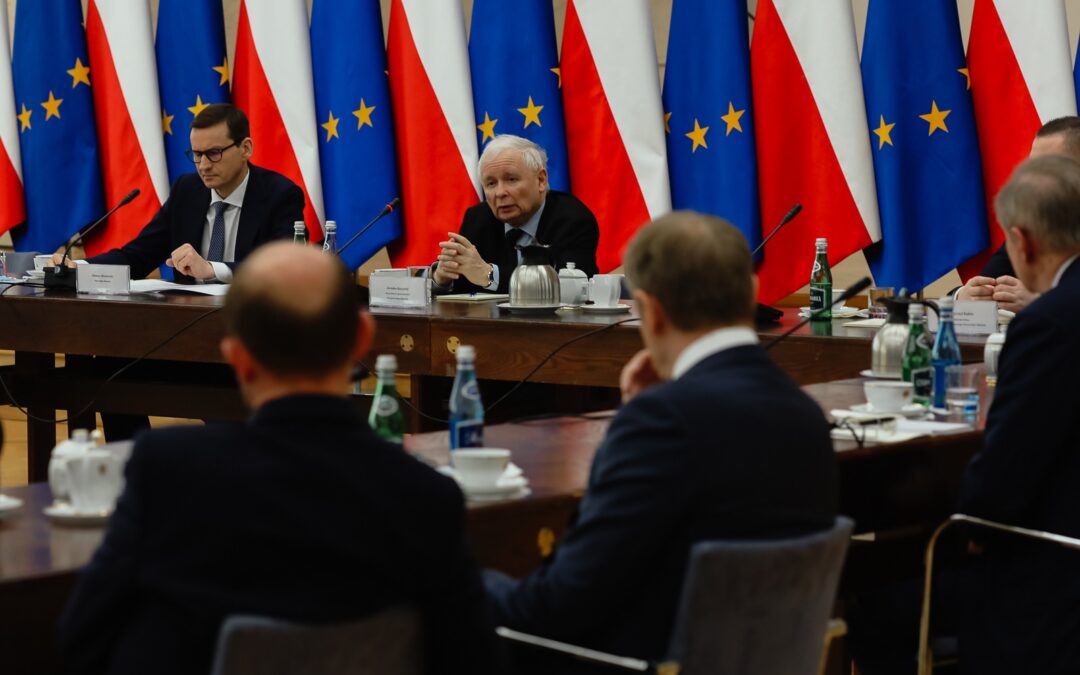The Polish government wants to change the constitution in response to Russia’s invasion of Ukraine. Among the measures it hopes to introduce are the exclusion of defence spending from public debt rules, the possibility of confiscating property belonging to Russian entities, and a tax on entities that do business in Russia.
The prime minister subsequently met with representatives of all opposition parties in parliament. At least some would need to support the proposals in order to meet the two-thirds majority needed to amend the constitution. After the meeting, opposition leaders expressed scepticism about the plans and called for more details.
Outlining the proposal this morning, government spokesman Piotr Müller said that, in light of recent events, the “Polish army must be quickly equipped to the highest level”.
“Therefore, one of the proposed changes to the constitution will be to exclude from the public debt threshold spending on the army, on armaments, in order to prepare for a potential attack by Russia,” said Müller, quoted by the Polish Press Agency (PAP).
Poland’s defence spending is soon set to increase by around 50%, after a law was introduced last week raising it from 2.1% of GDP last year to at least 3% in 2023. That could push public debt, which is already close to the constitutionally mandated limit of 60% of GDP.
The second issue that would require the constitution to be amended is allowing “confiscation of the property of Russian oligarchs, of entities, of private persons involved in supporting the activities of Russia, in particular those which have been subject to sanctions by the European Union”, said Müller.
A final element of the proposals, but one that may not require constitutional change, is the “introduction of additional taxation for entities that continue their economic activity in Russia”, added the government spokesman. There can be no tolerance for international cooperations that “feed the Russian war machine”.
These aims would fit with a new set of policies announced by the government on Friday to “de-Russify” Poland’s economy by introducing an “anti-Putin” shield.
In order to amend the constitution, the support of at least two thirds of the members of the Sejm, the lower house of parliament, is needed, as well as a simple majority in the upper-house Senate. The government, however, has only a narrow majority in the Sejm, while the Senate is controlled by the opposition.
The prime minister, Mateusz Morawiecki, and leader of the ruling Law and Justice (PiS) party, Jarosław Kaczyński, therefore today invited representatives of all parties in parliament to discuss the government’s plans and to seek their support for them.
After the meeting, opposition leaders warned that, while they were willing to support efforts to oppose Russia and support Ukraine, the government had not yet done enough to explain the details and necessity of today’s proposals.
W #KPRM trwa spotkanie premiera @MorawieckiM i wicepremiera Jarosława Kaczyńskiego z przedstawicielami klubów parlamentarnych i kół poselskich dotyczące propozycji zmian w związku z agresją Rosji na Ukrainę. pic.twitter.com/Y1deQ6RvsB
— Kancelaria Premiera (@PremierRP) March 21, 2022
“We will do everything to help…if the government has sensible, concrete [ideas],” said Donald Tusk, leader of Civic Platform (PO), the largest opposition group. But this needs to done in a “serious way, and not just words”, he added, quoted by Newsweek Polska.
Tusk said that at today’s meeting Morawiecki had failed to respond to his request for a list of companies in Poland that continue to buy coal from Russia, as well as his proposal to begin blocking such purchases without waiting for a European Union embargo.
Both Tusk and Robert Biedroń, one of the leaders of The Left (Lewica), the second largest opposition group, suggested that the government was using today’s meeting to play politics and shift attention onto the opposition rather than dealing with issues themselves.
Two of The Left’s other leaders, Włodzimierz Czarzasty and Adrian Zandberg, said that the government’s proposals remained too vague and that it had failed to answer questions. “I do not trust the PiS government or the clarity of its intentions,” said Czarzasty, quoted by Rzeczpospolita.
Jarosław Gowin, head of the Agreement (Porozumienie) party, which until last year was part of the government, said that it could do various things to address these issues without changing the constitution, including liquidating the disciplinary chamber for judges in order to unblock EU funds.
“None of us have any doubt that the security of Poland is the most important issue today and that it is worth paying any price for it,” said Szymon Hołownia, leader of Poland 2050 (Polska 2050).
“[But] we need to know clearly what this money would be spent on, how it would be spent, by whom it would be spent and what control we would have over it,” added Hołownia. “Unfortunately our experience of the spending of public money is not the best in recent years.”
Also speaking after the meeting, the head of PiS’s parliamentary caucus, Ryszard Terlecki, warned the opposition that now is the moment when “we will see to what extent [they] understand the seriousness of the situation and…decide whether it is Poland’s security or the struggle for power that is more important”.
“Time is short, we must hurry, Russia must lose this war,” added Terlecki, quoted by the Polish Press Agency (PAP). “Hence it would be good if it were possible to carry out these changes this week.”
Meanwhile, President Andrzej Duda’s chief of staff, Paweł Szrot, said that they would be carefully analysing the proposals and that Duda would discuss them with Morawiecki, reports PAP.

Daniel Tilles is editor-in-chief of Notes from Poland. He has written on Polish affairs for a wide range of publications, including Foreign Policy, POLITICO Europe, EUobserver and Dziennik Gazeta Prawna.




















